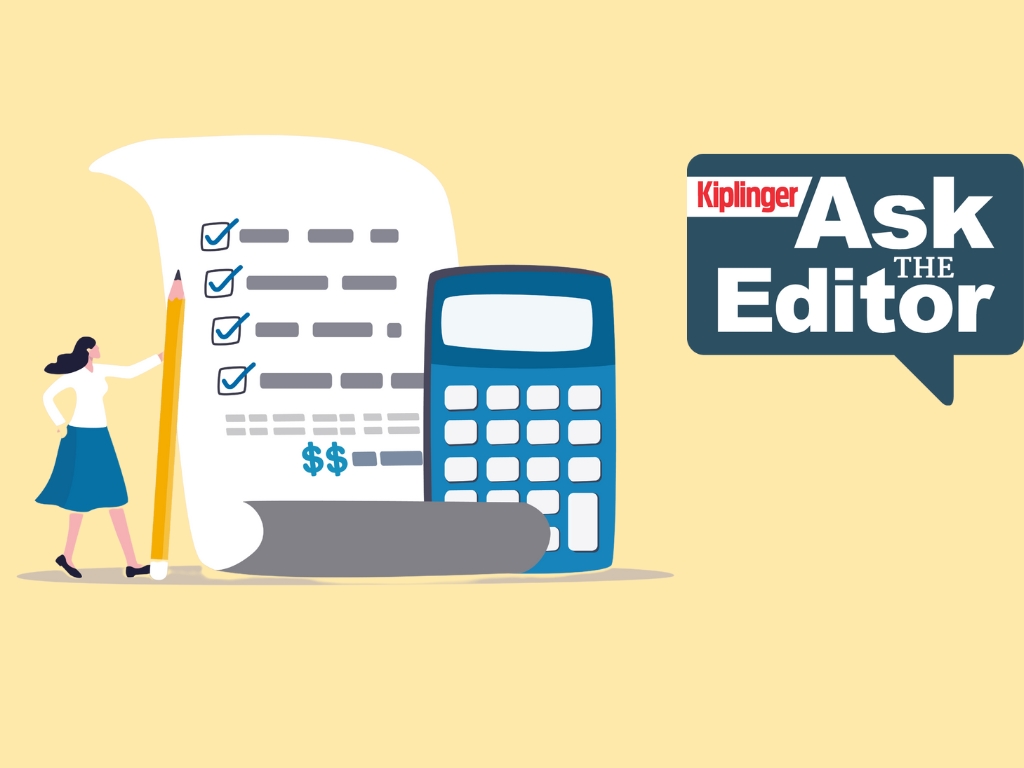Ask the Editor: Reader Questions, March 28 — Tax Returns
In our Ask the Editor series, Joy Taylor, The Kiplinger Tax Letter Editor, answers questions related to filing of tax returns and paying taxes.

Profit and prosper with the best of Kiplinger's advice on investing, taxes, retirement, personal finance and much more. Delivered daily. Enter your email in the box and click Sign Me Up.
You are now subscribed
Your newsletter sign-up was successful
Want to add more newsletters?

Delivered daily
Kiplinger Today
Profit and prosper with the best of Kiplinger's advice on investing, taxes, retirement, personal finance and much more delivered daily. Smart money moves start here.

Sent five days a week
Kiplinger A Step Ahead
Get practical help to make better financial decisions in your everyday life, from spending to savings on top deals.

Delivered daily
Kiplinger Closing Bell
Get today's biggest financial and investing headlines delivered to your inbox every day the U.S. stock market is open.

Sent twice a week
Kiplinger Adviser Intel
Financial pros across the country share best practices and fresh tactics to preserve and grow your wealth.

Delivered weekly
Kiplinger Tax Tips
Trim your federal and state tax bills with practical tax-planning and tax-cutting strategies.

Sent twice a week
Kiplinger Retirement Tips
Your twice-a-week guide to planning and enjoying a financially secure and richly rewarding retirement

Sent bimonthly.
Kiplinger Adviser Angle
Insights for advisers, wealth managers and other financial professionals.

Sent twice a week
Kiplinger Investing Weekly
Your twice-a-week roundup of promising stocks, funds, companies and industries you should consider, ones you should avoid, and why.

Sent weekly for six weeks
Kiplinger Invest for Retirement
Your step-by-step six-part series on how to invest for retirement, from devising a successful strategy to exactly which investments to choose.
Each week, in our new Ask the Editor series, Joy Taylor, The Kiplinger Tax Letter Editor, answers questions on topics submitted by readers. This week, since we are in the middle of tax filing season, she’s looking at questions related to filing of tax returns and paying taxes. (Get a free issue of The Kiplinger Tax Letter or subscribe.)
Q1: 20% QBI Deduction
I left my full-time job early last year and now work as an independent freelance consultant. I will report my business income and expenses on Schedule C. I heard about a 20% deduction. Can you explain what this is and whether I can claim it on my 2024 Form 1040 for my self-employment earnings?
Owners of LLCs, S corporations and other pass-through entities, as well as self-employed individuals, can deduct 20% of their qualified business income (QBI). QBI is income less deductions from your business. An important limitation applies to high earners in certain service fields. They include health, law, accounting, consulting, financial and brokerage services, performing arts, athletics, actuarial science, investing or trading in securities, or any business where the principal asset is the reputation or skill of its employees. If you’re in one of the affected fields and your total taxable income on your 2024 Form 1040 (before the QBI deduction) exceeds $383,900 for joint filers or $191,950 for single filers and head-of-household filers, the 20% deduction begins to phase out (the 2025 amounts are $394,600 and $197,300).
When filling out your 2024 Form 1040, you would complete either Form 8995 or 8995-A and attach it to your return. Most people use the simpler, one-page Form 8995. The 8995-A is for taxpayers with incomes over the thresholds set forth above. You then claim the 20% QBI deduction on line 13 of your Form 1040.
Note that this deduction ends after 2025, unless Congress acts before then. It was first enacted in the 2017 Tax Cuts and Jobs Act (TCJA) to provide some federal income tax parity between C corporations, which are taxed at a 21% federal income tax rate, and pass-through businesses, in which the individual owners pay federal income tax on their earnings up to a 37% tax rate.
— Joy Taylor, Editor The Kiplinger Tax Letter
Q2: Estimated Tax Payments
I filed the 2024 federal tax return for my wife and me using TurboTax. TurboTax printed out the quarterly estimated tax payments to make for 2025. If we make these estimated tax payments on time, will that protect us from being penalized for underpayment of taxes?
You won't have to pay the underpayment penalty for 2025 if you prepay, through estimated tax payments or withholding, at least 90% of your 2025 total tax bill or 100% of your 2024 total tax bill (110% if your adjusted gross income for 2024 exceeded $150,000). My thought is that the TurboTax quarterly estimated tax payment schedule is based on 100% (or 110%) of your 2024 tax liability. If that's the case, then you should be fine. Note that if, closer to year-end, you believe that you did not make enough estimated tax payments, you can always request more income tax withholding from your employer (if you're working) or from your Social Security benefits or IRA distribution (if you are retired). Tax withheld at any point in the year is treated as if evenly paid throughout the year.
— Joy Taylor, Editor The Kiplinger Tax Letter
From just $107.88 $24.99 for Kiplinger Personal Finance
Become a smarter, better informed investor. Subscribe from just $107.88 $24.99, plus get up to 4 Special Issues

Sign up for Kiplinger’s Free Newsletters
Profit and prosper with the best of expert advice on investing, taxes, retirement, personal finance and more - straight to your e-mail.
Profit and prosper with the best of expert advice - straight to your e-mail.
Q3: Tax Return Filing Due Date
I live in Florida and I heard that I can file my 2024 Form 1040 later than April 15. Is that correct, and if so, when do I have to pay my taxes?
The normal deadline date for filing the 2024 Form 1040 is April 15. But the IRS has given taxpayers in federally declared disaster areas more time to file and pay their federal taxes. Taxpayers in all of Alabama, Florida, Georgia, North Carolina and South Carolina, and parts of Alaska, New Mexico, Tennessee, Virginia and West Virginia, have until May 1 to file their Forms 1040 and pay taxes because of hurricanes and other disasters that occurred in those states in 2024. Victims of the early January Southern California wildfires have until October 15. And victims of the 2025 flooding and storms in Kentucky and West Virginia have until November 3. As a Florida resident, you have until May 1 to file your 2024 Form 1040 and pay any taxes that are due.
— Joy Taylor, Editor The Kiplinger Tax Letter
Q4: Return Filing Extension
I live in Florida, and I won’t be ready to file my 2024 Form 1040 by May 1. What is the due date for getting a filing extension?
Since the IRS has extended the deadline for Florida residents, for filing 2024 federal returns and paying federal taxes, to May 1, 2025, then you would have until May 1 to file Form 4868 to extend the May 1 due date for filing your 2024 Form 1040 to Oct. 15. To get the extension, a taxpayer must file Form 4868 by the original due date for the return, whether that is April 15 or another extended deadline date. So, in your case, May 1 is the deadline to file Form 4868.
However, if you want to file the Form 4868 electronically, you must do so by April 15. After that, you can only file the 4868 on paper. According to IRS, "though disaster-area taxpayers also qualify to request a tax filing extension between April 15 and May 1, 2025, these requests cannot be filed electronically. They can be filed only on paper."
It’s important to note that the Form 4868 extension applies only to extend the due date for filing your federal return, not to paying any taxes that you might owe. So, make sure that if you think you will owe taxes for 2024, you estimate the amount and pay the taxes with your extension by May 1.
In general, there are several ways to get an extension. You can use the IRS’s Free File to e-file Form 4868 and pay if you expect to owe tax. You can pay electronically through the IRS’s Direct Pay service or the Electronic Federal Tax Payment System (EFTPS). You can pay by credit card. You can use tax preparation software. Or you can mail a paper Form 4868 to the IRS with your payment.
— Joy Taylor, Editor The Kiplinger Tax Letter
More on Ask the Editor
We have already received many questions from readers on topics such as whether to request an identity protection personal identification number, how to check whether the IRS has processed an amended return filing, what we think will or won’t be included in a tax package from Congress this year, and much more. We’ll answer some of these in a future Ask the Editor round-up. So keep those questions coming!
Subscribers of The Kiplinger Tax Letter can ask Joy questions about a tax topic. You'll find full details of how to submit questions in The Kiplinger Tax Letter. (Get a free issue of The Kiplinger Tax Letter or subscribe).
Not all questions submitted will be published, and some may be condensed and/or combined with other similar questions and answers, as required editorially. The answers provided by our editors and experts, in this Q&A series, are for general informational purposes only. While we take reasonable precautions to ensure we provide accurate answers to your questions, this information does not and is not intended to, constitute independent financial, legal, or tax advice. You should not act, or refrain from acting, based on any information provided in this feature. You should consult with a financial or tax advisor regarding any questions you may have in relation to the matters discussed in this article.
Profit and prosper with the best of Kiplinger's advice on investing, taxes, retirement, personal finance and much more. Delivered daily. Enter your email in the box and click Sign Me Up.

Joy is an experienced CPA and tax attorney with an L.L.M. in Taxation from New York University School of Law. After many years working for big law and accounting firms, Joy saw the light and now puts her education, legal experience and in-depth knowledge of federal tax law to use writing for Kiplinger. She writes and edits The Kiplinger Tax Letter and contributes federal tax and retirement stories to kiplinger.com and Kiplinger’s Retirement Report. Her articles have been picked up by the Washington Post and other media outlets. Joy has also appeared as a tax expert in newspapers, on television and on radio discussing federal tax developments.
-
 Dow Adds 1,206 Points to Top 50,000: Stock Market Today
Dow Adds 1,206 Points to Top 50,000: Stock Market TodayThe S&P 500 and Nasdaq also had strong finishes to a volatile week, with beaten-down tech stocks outperforming.
-
 Ask the Tax Editor: Federal Income Tax Deductions
Ask the Tax Editor: Federal Income Tax DeductionsAsk the Editor In this week's Ask the Editor Q&A, Joy Taylor answers questions on federal income tax deductions
-
 States With No-Fault Car Insurance Laws (and How No-Fault Car Insurance Works)
States With No-Fault Car Insurance Laws (and How No-Fault Car Insurance Works)A breakdown of the confusing rules around no-fault car insurance in every state where it exists.
-
 Ask the Editor, February 6: Questions on Federal Income Tax Deductions
Ask the Editor, February 6: Questions on Federal Income Tax DeductionsAsk the Editor In this week's Ask the Editor Q&A, Joy Taylor answers questions on federal income tax deductions
-
 Ask the Editor, January 30: Questions on Social Security Benefits Taxation
Ask the Editor, January 30: Questions on Social Security Benefits TaxationAsk the Editor In this week's Ask the Editor Q&A, Joy Taylor answers questions on the taxation of Social Security benefits
-
 Ask the Tax Editor, January 23: Questions on Residential Rental Property
Ask the Tax Editor, January 23: Questions on Residential Rental PropertyAsk the Editor In this week's Ask the Editor Q&A, Joy Taylor answers questions on reporting income and loss from residential rental property.
-
 Ask the Editor, January 16: Tips for Filing Your Form 1040
Ask the Editor, January 16: Tips for Filing Your Form 1040Ask the Editor In this week's Ask the Editor Q&A, Joy Taylor answers questions on preparing and filing your 2025 Form 1040.
-
 Ask the Editor, January 9: How to Get Ready for Tax Filing Season
Ask the Editor, January 9: How to Get Ready for Tax Filing SeasonAsk the Editor In this week's Ask the Editor Q&A, Joy Taylor answers questions on the IRS tax filing season and your 2025 tax return
-
 Ask the Editor, December 19: Itemized Deductions
Ask the Editor, December 19: Itemized DeductionsAsk the Editor In this week's Ask the Editor Q&A, Joy Taylor answers questions on itemized deductions claimed on Schedule A of Form 1040
-
 Ask the Editor, December 12: IRAs, 401(k)s and RMDs
Ask the Editor, December 12: IRAs, 401(k)s and RMDsAsk the Editor In this week's Ask the Editor Q&A, Joy Taylor answers questions on IRAs, 401(k)s and required minimum distributions
-
 Ask the Editor, December 5: Capital Gains and Tax Planning
Ask the Editor, December 5: Capital Gains and Tax PlanningAsk the Editor In this week's Ask the Editor Q&A, Joy Taylor answers questions on capital gains tax rates and end-of-year tax planning